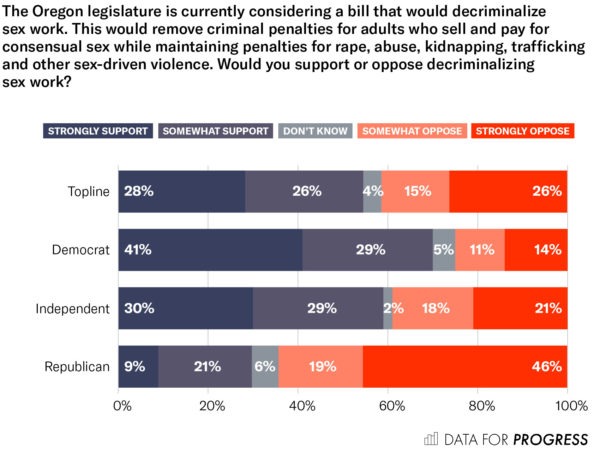Poll: Oregonians Support Decriminalizing Sex Work
New polling found majority support for full decriminalization of sex work as the Oregon legislature considers House Bill 3088.

A new poll from Data for Progress and The Lab, a policy vertical of The Appeal, found that a majority of Oregon voters support fully decriminalizing sex work. The poll comes as the Oregon legislature considers House Bill 3088—which would decriminalize prostitution, the promotion of prostitution, and commercial sex solicitation—and shows that 54 percent of likely voters in Oregon, including 70 percent of Democrats and 59 percent of independents, support the measure:

Key Context
Proponents of the bill, which would make Oregon the first state to fully decriminalize sex work, believe that protecting the rights of sex workers advances a world in which all workers are safe and no humans are trafficked. “By decriminalizing sex work, Oregon will become the first state to fully respect the human rights, dignity and safety of sex workers,” wrote RJ Thompson, managing director of the Sex Workers Project, and Wendy Weiss, an advocate for sex workers’ rights. Their vision? “A powerful, transformative example for all states to recognize sex work as work and to protect those most marginalized from violence and abuse.”
Rather than protecting vulnerable populations, criminalizing sex work actually makes it more likely they will endure exploitation and violence, advocates say. Arrests and prosecutions also disproportionately affect people of color, unhoused people, migrants, and members of the LBGT community, as well as people living with disabilities, according to the Urban Justice Center Sex Workers Project.
As Oregon moves toward decriminalization, other states and the District of Columbia may follow suit. New York recently repealed its discriminatory “walking while trans” anti-loitering law and may still go further: The Stop Violence in the Sex Trades Act, which is currently under consideration, would, per The New Republic, “remove[] criminal penalties associated with adults selling and buying sex,” and “strike prohibitions on ‘promoting’ prostitution, which can be used to criminalize any group of sex workers who work together.” D.C.’s 2019 hearing on a similar bill lasted more than 14 hours and included hundreds of testimonies, before it ultimately failed to get a vote.
Polling Methodology
From March 5 to March 9, 2021, Data for Progress conducted a survey of 565 likely voters in Oregon using web panel respondents. The sample was weighted to be representative of likely voters by age, gender, education, race, and voting history. The survey was conducted in English. The margin of error is ±4 percentage points.

